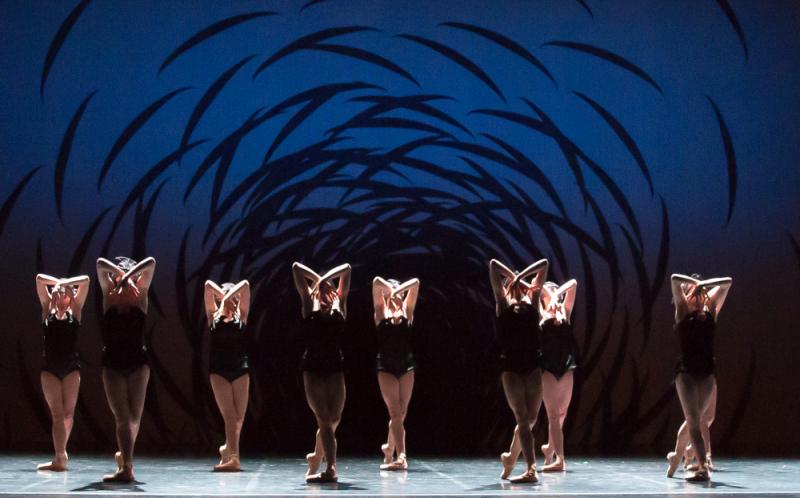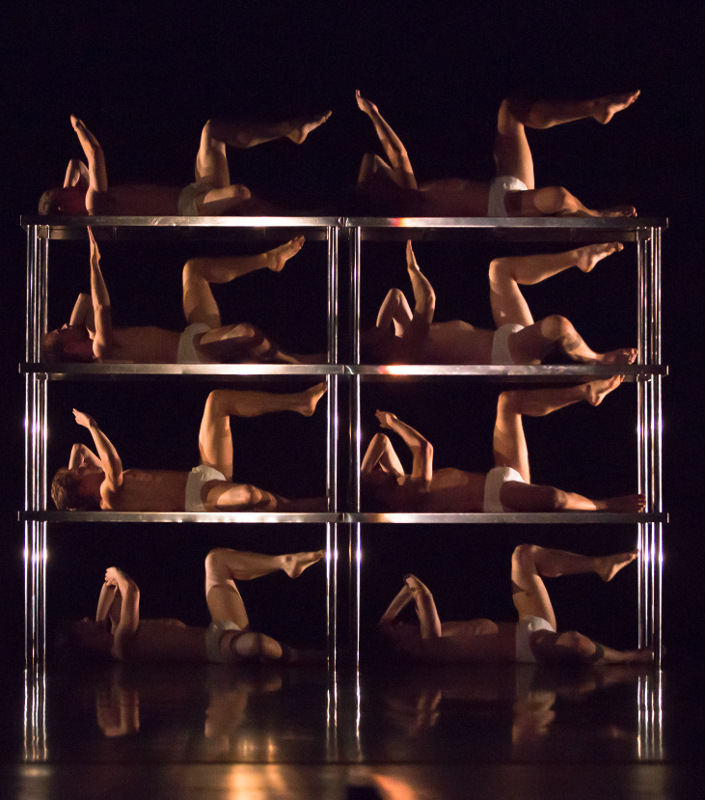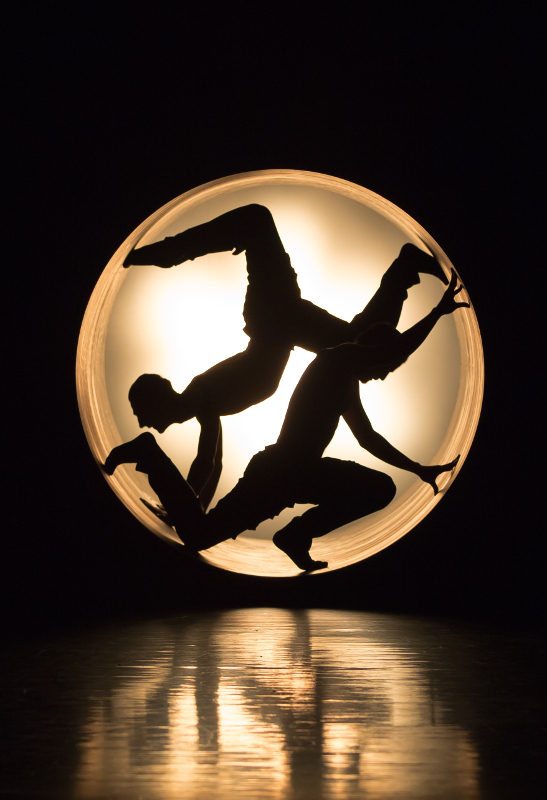Scottish Ballet, Sadler's Wells review - striking and memorable dance | reviews, news & interviews
Scottish Ballet, Sadler's Wells review - striking and memorable dance
Scottish Ballet, Sadler's Wells review - striking and memorable dance
Crystal Pite's 'Emergence' is a smart pick for the company

Years ago, MC14/22 (Ceci est mon corps), the Angelin Preljoçaj piece with which this Scottish Ballet double bill opens, made a deep impression on Christopher Hampson.
But, having seen the piece, you might equally say – in the immortal words of Steps c.1999 – that some things are better best forgotten. MC14, as it is usually abbreviated, is a 55-minute "retelling" of the Gospel of Mark featuring 12 topless male dancers, six stainless steel tables, one bowl of water, some unidentified black stuff (soot?), and a lavishly used roll of parcel tape. It is, to put it generously, challenging to watch, and – with a "score" of clanking and wailing noises mostly borrowed from the sound studio of a cheap sci-fi movie – a trial to listen to as well.
 The first time I saw it, at this bill's Edinburgh Festival outing in 2016, I fought earnestly to follow the eucharistic allegory: this chest beating is like the non sum dignus, that table-wiping gesture a garbled reference to the actions of conscrecation; this tableau recalls Da Vinci's Last Supper, that scene with open mouths the distribution of hosts. Second time round, and watching from a higher vantage point in the first circle, I noticed an alternative or parallel interpretation of the movement as being an essay on what bodies – dancers' bodies – do. Ceci est mon corps, and my body sleeps (pictured right), drinks, washes, caresses, gets massaged and prodded (on the tables), has sex, fights, sings, eats, hurts and is hurt. Attempts to hobble or shut down the body – the two memorable scenes where one dancer is wrapped in crippling parcel tape and another's song is interrupted by violent assault – don't work: its drive to move and to express is too strong.
The first time I saw it, at this bill's Edinburgh Festival outing in 2016, I fought earnestly to follow the eucharistic allegory: this chest beating is like the non sum dignus, that table-wiping gesture a garbled reference to the actions of conscrecation; this tableau recalls Da Vinci's Last Supper, that scene with open mouths the distribution of hosts. Second time round, and watching from a higher vantage point in the first circle, I noticed an alternative or parallel interpretation of the movement as being an essay on what bodies – dancers' bodies – do. Ceci est mon corps, and my body sleeps (pictured right), drinks, washes, caresses, gets massaged and prodded (on the tables), has sex, fights, sings, eats, hurts and is hurt. Attempts to hobble or shut down the body – the two memorable scenes where one dancer is wrapped in crippling parcel tape and another's song is interrupted by violent assault – don't work: its drive to move and to express is too strong.
The dancers of Scottish Ballet are strong, and beautiful too in the warm, low light, but they perform the piece commendably, rather than dangerously; instead of the simmering intensity which might help to beguile 55 long minutes we see 12 polished, professional, and preternaturally-composed young men. It is a composure some in the audience might envy, for MC14 can provoke reactions of wild resesentment – the first time I saw it, there were audible walkouts; this time, ranting voices aplenty at the interval. For the record, I loathed it passionately on the first viewing, but found myself oddly hypnotised on the second.
 After Crystal Pite's reign of triumph on London stages in the last few years – capped by her excellent Flight Pattern for the Royal Ballet in March – there were high expectations for the spiky, bee-inspired Emergence (pictured left, and main picture). A 2009 piece for the National Ballet of Canada, it's a smart pick for Scottish: visually striking, very memorable, and made for a classical company so they get to use their pointe shoes. Pite's talent for spine-tingling and original choreography is in evidence throughout, particularly in her speciality, group formations: the uncanny insectoid stalking of the female dancers on pointe is a movement of genius; so too is their entrance in a quivering, not-quite unison that brilliantly evokes the way bees hover.
After Crystal Pite's reign of triumph on London stages in the last few years – capped by her excellent Flight Pattern for the Royal Ballet in March – there were high expectations for the spiky, bee-inspired Emergence (pictured left, and main picture). A 2009 piece for the National Ballet of Canada, it's a smart pick for Scottish: visually striking, very memorable, and made for a classical company so they get to use their pointe shoes. Pite's talent for spine-tingling and original choreography is in evidence throughout, particularly in her speciality, group formations: the uncanny insectoid stalking of the female dancers on pointe is a movement of genius; so too is their entrance in a quivering, not-quite unison that brilliantly evokes the way bees hover.
Nevertheless, I'll buzz against the swarm and say that it could have been better: some of the dancers were visibly challenged by Pite's uncompromisng physical language, and the piece doesn't have quite the same hackle-raising power as her most recent work. The minimalist score makes it no friends either, though the metallic honey-gold of the lighting and the elegant black parabolas of the backcloth are legitimately gorgeous.
A mixed success of a mixed bill, then. See it for the Pite, but prepare – perhaps – to need a stiff drink after the Preljoçaj.
- Scottish Ballet are performing this double bill at Sadler's Wells until 10 June.
- Read more dance articles on theartsdesk
rating
Share this article
The future of Arts Journalism
You can stop theartsdesk.com closing!
We urgently need financing to survive. Our fundraising drive has thus far raised £49,000 but we need to reach £100,000 or we will be forced to close. Please contribute here: https://gofund.me/c3f6033d
And if you can forward this information to anyone who might assist, we’d be grateful.

Subscribe to theartsdesk.com
Thank you for continuing to read our work on theartsdesk.com. For unlimited access to every article in its entirety, including our archive of more than 15,000 pieces, we're asking for £5 per month or £40 per year. We feel it's a very good deal, and hope you do too.
To take a subscription now simply click here.
And if you're looking for that extra gift for a friend or family member, why not treat them to a theartsdesk.com gift subscription?
more Dance
 'We are bowled over!' Thank you for your messages of love and support
Much-appreciated words of commendation from readers and the cultural community
'We are bowled over!' Thank you for your messages of love and support
Much-appreciated words of commendation from readers and the cultural community
 R:Evolution, English National Ballet, Sadler's Wells review - a vibrant survey of ballet in four acts
ENB set the bar high with this mixed bill, but they meet its challenges thrillingly
R:Evolution, English National Ballet, Sadler's Wells review - a vibrant survey of ballet in four acts
ENB set the bar high with this mixed bill, but they meet its challenges thrillingly
 Like Water for Chocolate, Royal Ballet review - splendid dancing and sets, but there's too much plot
Christopher Wheeldon's version looks great but is too muddling to connect with fully
Like Water for Chocolate, Royal Ballet review - splendid dancing and sets, but there's too much plot
Christopher Wheeldon's version looks great but is too muddling to connect with fully
 iD-Reloaded, Cirque Éloize, Marlowe Theatre, Canterbury review - attitude, energy and invention
A riotous blend of urban dance music, hip hop and contemporary circus
iD-Reloaded, Cirque Éloize, Marlowe Theatre, Canterbury review - attitude, energy and invention
A riotous blend of urban dance music, hip hop and contemporary circus
 How to be a Dancer in 72,000 Easy Lessons, Teaċ Daṁsa review - a riveting account of a life in dance
Michael Keegan-Dolan's unique hybrid of physical theatre and comic monologue
How to be a Dancer in 72,000 Easy Lessons, Teaċ Daṁsa review - a riveting account of a life in dance
Michael Keegan-Dolan's unique hybrid of physical theatre and comic monologue
 A Single Man, Linbury Theatre review - an anatomy of melancholy, with breaks in the clouds
Ed Watson and Jonathan Goddard are extraordinary in Jonathan Watkins' dance theatre adaptation of Isherwood's novel
A Single Man, Linbury Theatre review - an anatomy of melancholy, with breaks in the clouds
Ed Watson and Jonathan Goddard are extraordinary in Jonathan Watkins' dance theatre adaptation of Isherwood's novel
 Peaky Blinders: The Redemption of Thomas Shelby, Rambert, Sadler's Wells review - exciting dancing, if you can see it
Six TV series reduced to 100 minutes' dance time doesn't quite compute
Peaky Blinders: The Redemption of Thomas Shelby, Rambert, Sadler's Wells review - exciting dancing, if you can see it
Six TV series reduced to 100 minutes' dance time doesn't quite compute
 Giselle, National Ballet of Japan review - return of a classic, refreshed and impeccably danced
First visit by Miyako Yoshida's company leaves you wanting more
Giselle, National Ballet of Japan review - return of a classic, refreshed and impeccably danced
First visit by Miyako Yoshida's company leaves you wanting more
 Quadrophenia, Sadler's Wells review - missed opportunity to give new stage life to a Who classic
The brilliant cast need a tighter score and a stronger narrative
Quadrophenia, Sadler's Wells review - missed opportunity to give new stage life to a Who classic
The brilliant cast need a tighter score and a stronger narrative
 The Midnight Bell, Sadler's Wells review - a first reprise for one of Matthew Bourne's most compelling shows to date
The after-hours lives of the sad and lonely are drawn with compassion, originality and skill
The Midnight Bell, Sadler's Wells review - a first reprise for one of Matthew Bourne's most compelling shows to date
The after-hours lives of the sad and lonely are drawn with compassion, originality and skill
 Ballet to Broadway: Wheeldon Works, Royal Ballet review - the impressive range and reach of Christopher Wheeldon's craft
The title says it: as dancemaker, as creative magnet, the man clearly works his socks off
Ballet to Broadway: Wheeldon Works, Royal Ballet review - the impressive range and reach of Christopher Wheeldon's craft
The title says it: as dancemaker, as creative magnet, the man clearly works his socks off
 The Forsythe Programme, English National Ballet review - brains, beauty and bravura
Once again the veteran choreographer and maverick William Forsythe raises ENB's game
The Forsythe Programme, English National Ballet review - brains, beauty and bravura
Once again the veteran choreographer and maverick William Forsythe raises ENB's game

Add comment